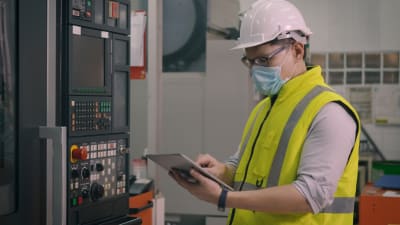CNC machinists play a huge role in any modern developmental process. They can leverage the power of highly advanced machines – computer numerical control machines – to design and manufacture products at an incredibly high level of precision.
To become a CNC machinist in Massachusetts is a great feat, and luckily for interested individuals, it is a direct process with the possibility of running smoothly – if candidates know what they’re doing from the start. And that is the exact purpose of this article.
We highlight the key steps and considerations needed to start a successful CNC machinist career in Massachusetts so that candidates can have a smooth and straightforward time.
How to Become a CNC Machinist in Massachusetts
Below are the key steps required to become a CNC machinist in Massachusetts.
Step 1: Meet the Basic Requirements
Employers and training institutions typically set the basic requirements for becoming a CNC machinist in Massachusetts. These destinations typically require a high school diploma or GED and proficiency in a few basic topics in mathematics, physics, and computer science.
Step 2: Enroll in a Training Program
Students seeking training as aspiring CNC machinists may go through academic training or “on the job.” Both are valid avenues with different pros and cons.
Academic Training
Several post-secondary schools in Massachusetts allow candidates to register for CNC machine training. These programs vary in length, but all have what it takes to give candidates the right career starting point.
In an academic CNC machine program, students focus on key theoretical concepts. Some schools also allow students to work with actual CNC machines.
Even though academic training is enough to secure employment, candidates may consolidate what they’ve learned with on-the-job training arrangements.
On-the-Job Training
A few training programs are designed to allow candidates to learn “on the job.” Professional organizations that assign students to specific companies within the state offer many.
Here, they may learn everything they need to start their careers while working. Even though on-the-job training avenues may not be considered actual employment in some cases, they may also offer students the opportunity to make some income as they learn.
Step 3: Resume & Employment
After completing their training, CNC machinists in Massachusetts may create a sound resume and apply for open positions. To make their resume even more impressive, they may pursue professional certification opportunities, the most prominent of which we look at below.
Consider trades with similar paths:
Licensure & Certification Requirements
Most trade and technical professions in Massachusetts typically require professionals to obtain a license by passing a licensing exam. However, fresh CNC machinists in the state will be glad to know that they don’t have to go through either of these processes before they can start working professionally.
However, they may earn professional credentials to improve their credibility and appeal. Several options are available in this regard, but the most popular are those offered by the National Institute for Metalworking Skills.
The institute offers credentials, including Certified CNC Lathe Programming Setup and Operations, CNC Milling 1, Manufacturing Technician Level 1, and Certified Metalworking Fluids Specialist.
Top CNC Machinist Schools in Massachusetts
Below are some of Massachusetts’s most notable training destinations for aspiring CNC machinists.
North Shore Community College
Boston, MA Online + Campus
North Shore Community College offers a wonderful CNC machinist training program for candidates over 18. Thanks to the GE Foundation Grant, students here also enjoy access to financial aid.
Tuition
$5,352 - $10,920Contact
(781) 477-2107
info@northshore.edu
Benjamin Franklin Cummings Institute of Technology
Boston, MA Online + Campus
The Manufacturing Technology—CNC Technology certificate program at Benjamin Franklin Cummings Institute of Technology teaches candidates everything they need to secure entry-level employment.
Email: admissions@franklincummings.edu
Tuition
$17,550 - $18,228Contact
(877) 400-2348
Email in Bio
Center for Manufacturing Technology
Woburn, MA Online + Campus
The Center for Manufacturing Technology in Woburn is another worthwhile training destination in Massachusetts. Students can receive theoretical instructions and hands-on training to become future CNC machinists here.
Email: admissions@customtrainingcenter.com
Tuition
$5,550 - $8,000Contact
(781) 935-4940
Email in Bio
Explore CNC machinist schools in Massachusetts by city:
Salary & Career Outlook
An average CNC machinist in Massachusetts earns around $85,005 annually. If the CNC machinist happens to be among the top 10% in the state, the same occupation may produce an annual average salary of up to $113,736.
It could also yield an annual average salary of $63,532 for those among the bottom 10%. While many factors influence how much annual average salary a CNC machinist in Massachusetts will earn, experience and location remain two of the most important.
Concerning location, notable cities for CNC machinists in Massachusetts include Walpole, with an annual average salary of $115,995; Lawrence, with an annual average salary of $97,992; Stoughton, with an annual average salary of $86,878; and Kingston, with an annual average salary of $81,337.





